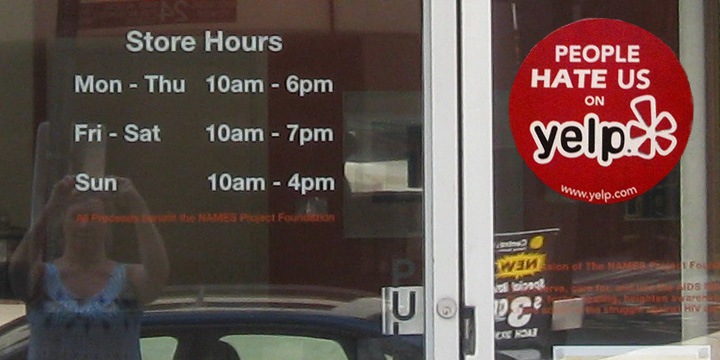The owners of Botto Italian Pizza Bistro are a little…straightforward. Look no further than their FAQ page, which is either a brilliant marketing prank or a very deliberate warning to would-be customers: “Do you have ice? No. Why? Because that’s the way, uh huh uh huh, we like it.”
It’s this level of anti-service that defines Botto, which could potentially become a thorn in the side of Yelp.
Botto’s Rebuttal
Botto is waging a campaign to become the worst-reviewed restaurant on Yelp, which they say is a way to get back at the review aggregator. The managers of Botto, David Cerretini and Michele Massimo, believe Yelp has virtually no bearing over the success of their restaurant. To prove their point, they are offering 25% discount to customers who leave negative reviews. On their home page, and in interviews, the two repeatedly say Yelp doesn’t exist in Italy. They even go so far as to say people who take Yelp too seriously should turn the computer off and go get a life outside of the glowing screen.
They actively warn customers that they don’t take customer service seriously and they expect their food to speak for itself. They do everything wrong, according to the textbooks on restaurant growth, yet they claim business is actually great. (They also add asking about business is a terrible way to start a conversation.)
The Results
At last check Botto had over 1100 live reviews and 600+ additional filtered reviews. It seems they are getting a major PR coverage from the news and many people are actually leaving them fake reviews from all over the world. Some of these reviews are really funny. Here are some examples:
Review by William B. from Easton, MD: ” I was hoping to eat at Botto Italian Bistro. I live in Maryland. Botto IS NOT located in Maryland. This is unacceptable. I will not be eating here until the restaurant is relocated to Maryland (or if I visit California)”
Review by Kevin B. Brookfield, IL: ” I called for a delivery and they had the nerve to tell me they don’t deliver to the Chicago area!!! Look, we’re right across the Mississippi River (give or take a couple hundred miles)! I thought ALL pizza places delivered! Just for that, I won’t even ask if I could get a take out order! And I bet their pizza is to die for, too.”
Review by Natalia P. Palmas de Gran Canaria, Spain: ” Your food seems delicious, but that you do not offer shipping to Canary Islands (Spain)…. That I cannot accept… C’mon what kind of service do you offer if you don’t deliver to 10000km afar? I better go to another place!”
The Yelp Model
For its part, Yelp is totally baffled by this prospect. According to Ars Technica, who asked Yelp spokesman Vince Sollitto about the campaign, Yelp seems genuinely concerned about whether this is the best strategy for Botto. It points to the Harvard study, which shows evidence that there is a correlation between star increases and bumps in revenue, “for every star increase, restaurants see an uplift in revenue between five and nine percent.”
The study actually says businesses with a one-star rating can expect a decrease in revenue from 5-9%. Clearly, there are some exceptions to this rule.
The study also suggests independent restaurants like Botto stand to gain the most from the widespread usage of Yelp. What’s interesting is while chain restaurants see a decrease in market share, people are posting creative and descriptive reviews though Yelp for independent businesses.
The Harvard study also admits some reviews are obviously faked, but takes it a step further to show users typically are smart enough to consult more than one review for verification purposes. The Harvard study concludes consumer reviews may have a greater impact than more traditional methods of building reputation, like word of mouth.
Botto also claims Yelp has harassed the restaurant after the bad reviews began to pile up. First, there were voice messages and phone calls urging the restaurant to subscribe to the Yelp advertising service, in order to improve reviews and receive more visibility. Botto also received several emails from Yelp’s sales people and customer service inquiring about advertising.
All of this was vehemently denied by Vince Sollitto, who initially claimed Yelp had contacted Botto once in June of 2013. Sollitto then dug deeper into the matter to uncover that Yelp had in fact contacted Botto almost weekly throughout 2012, adding that Botto could have simply requested to be placed on Yelp’s internal Do Not Call list.
Yelp’s Course of Action
Yelp hasn’t elaborated on how it intends on handling this situation. It has sent a warning to Botto about offering incentives for reviews, which was mockingly sent back with all instances of “Botto” changed to “Yelp” and a few choice words added throughout.
It appears, for now, that Botto has won this dispute and shown maybe reviews aren’t as important as we all thought. Though it seems like quite an extreme way to prove that point. For my part, I wonder if Yelp can legally restrict Botto’s access to its own page permanently. Yelp has threatened to place a banner on Botto’s page informing consumers that the business has offered incentives for reviews, but that may not carry much weight for two owners bent on gaming the system.
Personally, I do not encourage this approach for your business, as it can have terrible consequences if it backfires. Yelp is taking active steps to improve the authenticity of its reviews with features like video. If the Do Not Call list is authentic, which it most likely isn’t, ask to be added if you are bothered by Yelp representatives. I have to admit though, this is a refreshing change of pace from watching my clients and peers get bossed around by Yelp. The restaurant might gain more business from the PR it is getting!
Featured image by author.


